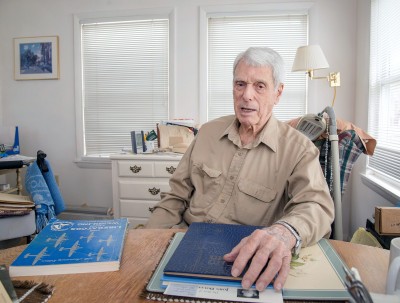Milford Ray Allen
By Paul Wood

Photo By Robin Scholz/The News-Gazette
URBANA — The Timberwolves were night soldiers, some of the toughest in World War II, and Milford Ray Allen was one of those tough sons of guns, spending 196 consecutive days on the front lines.
After D-Day, it looked for a while like the war might be over by Christmas. But on Christmas Eve, Allen, now 91, saw some of the toughest fighting of the war.
It was the Battle of the Bulge, a desperate counter-offensive by the Germans. In one of the coldest winters on record, the ground was “frozen like concrete.”
That was tough on U.S. soldiers, but an advantage for German tanks.
“Nothing in hell must stop the Timberwolves” was the proud slogan of commanding Gen. Terry Allen — no relation — and a wolf shoulder patch is one of the Urbana man’s framed treasures.
Staff Sgt. Allen grew up on a southern Missouri cotton plantation and was called in for an Army physical in February 1943.
After basic training in Texas, Allen was one of 14,000 sent from the U.S. to Glasgow on the Queen Elizabeth, a luxury liner that steamed without a convoy because it could outrun U-boats, even zig-zagging.
“It wasn’t a luxury for us,” he says.
Allen says the Queen Elizabeth did get shot at once near the end of the voyage.
A gunner, Allen became attached to the 104th Infantry Division, which landed in France in September 1944 and moved on to Belgium.
They cleared the docks in Antwerp, a major port. The 104th then moved toward Germany, sometimes using their night-fighting skills.
Allen recalls that Quad-50s, half-tracks mounted with .50-caliber machine guns, poured fire over their heads as they attacked. At times, they had 32 Quad-50s for support, he says.
The Germans were also awed by Allied high-speed artillery, he says.
But the enemy had its own tricks. At one point, Allen’s men were strafed by American P-47 Thunderbolts. They’d been captured and were now being flown by German aviators.
“They strafed both sides of the watershed,” he says.
On one occasion, he was wounded on the front line, but didn’t receive a Purple Heart — the front had no physicians to verify the wound, which was partially deflected by his billfold.
October was rainy, chilly, wet and muddy. The 104th liberated Zundert, Holland, and moved on to Aachen, Germany.
They were sometimes on the defensive on the Roer (Ruhr) River before eventually being able to move on to Cologne in March.
As the war in Europe came to a close, Allen met Soviet troops moving to the Elbe River from the opposite direction; they quickly established a no-man’s land between them.
His service didn’t end when the war in Europe did, on May 8, 1945.
Allen re-upped and joined a military-police unit. One of his duties was rounding up deserters from the war and looking for those who were missing in action.
In 1946, Allen was in another war — a peacekeeping mission preventing Italians and Yugoslavs from killing each other when ethnic Italians were being forced out of their homes.
Out of the service, in 1948, he married Bernita, who has passed away, as has their only son.
Allen eventually moved to Urbana because he had family here.
He found work as a mason, and built his home on Cottage Grove in two months, with help from some brick-laying buddies.
He retired in 1983.
Do you know a veteran who could share a story about military service? Contact staff writer Paul Wood at pwood@news-gazette.com.
Read more stories from local veterans:
 Robert Porter
CHAMPAIGN — Though his main service was in the Korean War, Robert Porter witnessed the aftermath of destruction on Nagas …
Robert Porter
CHAMPAIGN — Though his main service was in the Korean War, Robert Porter witnessed the aftermath of destruction on Nagas …
 Bon Bui
URBANA — Wounded six times in battle, Major Bon Bui spent 13 years starving in a prison and being “re-educated” in commu …
Bon Bui
URBANA — Wounded six times in battle, Major Bon Bui spent 13 years starving in a prison and being “re-educated” in commu …
 Robert Tuchel
CHAMPAIGN — “I got shot up a lot, but I never got shot down,” says Capt. Robert Tuchel, who flew 35 missions piloting a …
Robert Tuchel
CHAMPAIGN — “I got shot up a lot, but I never got shot down,” says Capt. Robert Tuchel, who flew 35 missions piloting a …